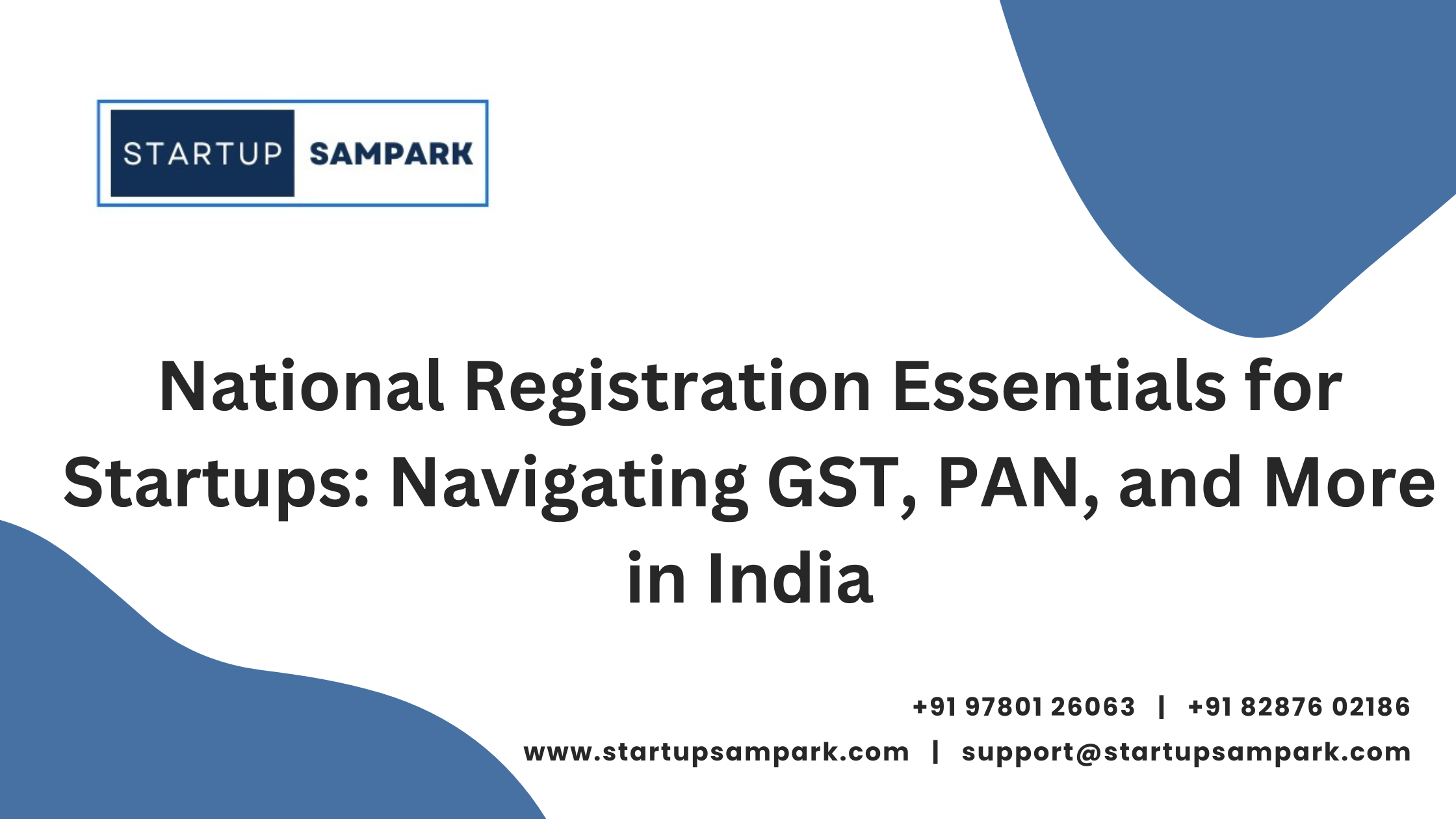National Registration Essentials for Startups: Navigating GST, PAN, and More in India
Introduction
National registration is essential for startups in India that seek to operate across state lines or plan for growth and scalability on a larger scale. Unlike local registration, which limits a business’s operations to a specific region, national registration provides broader legal recognition and access to markets throughout the country. For startups, registering nationally comes with the added benefit of formalizing your business under the government’s purview, ensuring legal compliance, and allowing access to important financial services. Key components of national registration include securing GST registration, obtaining a PAN for tax purposes, and adhering to corporate laws such as those under the Ministry of Corporate Affairs (MCA).
The Importance of Obtaining GST Registration for Startups
One of the most critical steps for startups operating on a national level is registering under the Goods and Services Tax (GST) regime. GST is a comprehensive indirect tax levied on the manufacture, sale, and consumption of goods and services throughout India, and it replaces many older indirect taxes. Startups with an annual turnover exceeding ₹20 lakh (₹10 lakh for certain states) must mandatorily register for GST. Even if your startup has a lower turnover, registering for GST can offer advantages such as input tax credits, simplified tax compliance, and the ability to sell products or services across state borders. GST registration is a must for startups that plan to scale their operations nationally or conduct business with corporate clients.
-
 Startup Registration (DPIIT Recognition)₹8,850.00
Startup Registration (DPIIT Recognition)₹8,850.00
PAN (Permanent Account Number): A Tax Essential for Startups
A Permanent Account Number (PAN) is another critical component of national registration for startups. PAN is a unique ten-digit alphanumeric identifier issued by the Income Tax Department and is required for various financial transactions, including tax filings, opening a business bank account, and entering into large financial contracts. For startups, having a PAN is mandatory for filing corporate income tax returns and for deducting tax at source (TDS) from employee salaries and vendor payments. Additionally, PAN is often required for securing loans, raising capital, or obtaining credit facilities, making it essential for any startup planning to scale. The process for obtaining a PAN is straightforward but integral to your business’s financial and legal operations.
Corporate Registration: Private Limited Company or LLP
For startups planning national operations, registering as a Private Limited Company (Pvt. Ltd.) or a Limited Liability Partnership (LLP) is a common route. These forms of business entities are registered with the Ministry of Corporate Affairs (MCA) and offer legal protection and credibility. A Pvt. Ltd. company provides limited liability protection to its shareholders, meaning that the shareholders’ personal assets are protected in case of business debts. An LLP, on the other hand, combines the advantages of both a partnership and a corporation, offering limited liability but with a simpler structure. Both forms are recognized at a national level, allowing startups to operate across India, raise funding, and enter into contracts easily with clients or investors.
Additional National Registrations: Importer Exporter Code (IEC) and Trademarks
For startups involved in cross-border trade or those wishing to protect their brand, obtaining an Importer Exporter Code (IEC) and trademark registration is vital. An IEC is mandatory for businesses dealing in the import or export of goods or services. This registration allows startups to enter global markets, providing access to new revenue streams. Similarly, trademark registration helps protect your brand name, logo, or slogan at a national level, ensuring that no other entity can legally use your business’s intellectual property. National trademark registration not only safeguards your brand but also adds value to your business by establishing trust and recognition among consumers and investors.
Compliance and Ongoing Obligations for Nationally Registered Startups
While national registration offers numerous advantages in terms of market access, legal protection, and business credibility, it also comes with ongoing compliance obligations. Startups registered under national frameworks, such as Pvt. Ltd. companies or LLPs, are required to file annual financial statements, conduct board meetings, and comply with statutory audits. GST-registered businesses must file monthly or quarterly returns, depending on turnover. Non-compliance with these obligations can result in hefty fines, penalties, or even the suspension of the business’s registration. Therefore, it is crucial for startup founders to either maintain a dedicated compliance team or hire professional services to manage these regulatory requirements and ensure the business remains in good standing.
National Registration as a Path to Growth and Scalability
For startups in India, national registration is more than just a legal formality; it is a stepping stone toward larger growth and operational freedom. By registering under national frameworks like GST, PAN, and the MCA, startups can access national markets, establish credibility with investors and clients, and ensure compliance with tax and corporate laws. While the registration process may involve more documentation and regulatory oversight than local registration, the long-term benefits of national registration, including enhanced scalability, better tax advantages, and legal protection, make it a valuable option for entrepreneurs looking to grow their business across the country.
Startup, India
-
 Startup Registration (DPIIT Recognition)₹8,850.00
Startup Registration (DPIIT Recognition)₹8,850.00















Post Comment